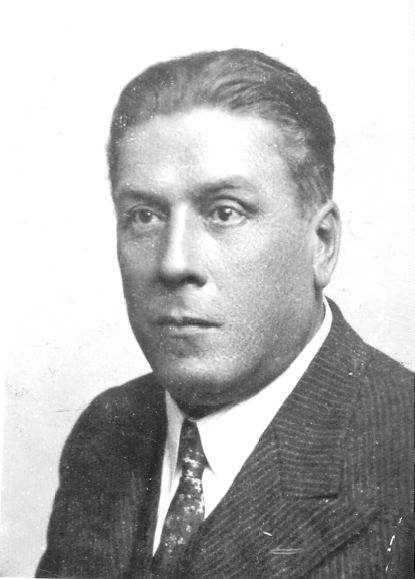
Born: March 28, 1886, Serpuchov near Moscow, Russia
Died: May 13, 1939, Warsaw, Poland.
Early days. Son of Izydor Lesniewski- a communications engineer - and of Helena Paczewski.
In 1896 he attended the "realna" School in Trojtskosawski, near Kiachta and Majmaczyn, in Southern Siberia on the Mongolian border, where his father was at that time working on the construction of the Trans-Siberian Railway. In 1899 he enrolled in the gymnasium of Irkutsk. In 1903 he left school to take his leaving examination in 1904 as an external candidate.
Higher education. He received his education chiefly in German universities (Leipzig, Heidelberg, Munich), studying Philosophy and Mathematics for 8 years "with breaks." Before or after going to Munich, he possibly went back to St. Petersburg, where he met the renowned philosopher of law Leon Petrazycki. In the summer semester of 1910, wanting to write his doctorate under Kazimierz Twardowski's supervision, he finally arrived at the University of Lwow (now Lviv, Ukraine), which was then, as Lemberg, the capital of Galicia ( Austro-Hungarian Empire). It seems that Lesniewski completed his mathematical education in Lwow taking an interest in logical paradoxes, Schroeder's algebra of logic, the theory of relations and probability theory.
Early research papers. In 1910 Lesniewski wrote his first paper, which he submitted as a doctoral dissertation obtaining the title of doctor in July 1912. While in Paris (1911) he finished his second paper. In 1913 he sojourned in Sanremo (Italy) for a couple of months, where apart from revising and translating the previous two articles into Russian he wrote two other papers.
Marriage. Probably in the spring he married Zofia Prewysz-Kwinto.
Theory of truth and meaning. The 1911-13 papers chiefly concern Lesniewski's theory of truth and meaning, and should be seen as the first philosophical foundations of Ontology. After France and Italy he possibly went to St. Petersburg. From the second half of 1913 Lesniewski moved to Warsaw. From October 1913 he led the Philosophy Session of the Polish Teachers' Circle in Warsaw (Nowe Tory). In January 1914, in Kimborciszki, near the Eastern border of Lithuania, where his wife's father had an estate, he elaborated his powerful and original solution of Russell's Paradox .In 1915 he left for Russia. As far as we know, he lived in Moscow from 1915, where he taught mathematics in at least two Polish schools up to 1918. In Moscow he also carried on a lecturing activity which was agitational in character, on socialist themes.
Mereology. He dedicated the Russian years chiefly to the elaboration of Mereology. In 1916 he published Foundations of the General Theory of Sets I , which, was the first system of Mereology. As a professor he gave lectures in logic. In October 1916 Lesniewski was elected to the Polish Society of Teachers in Moscow.
Professorship. In the Academic Year 1919/20 Lesniewski got the Chair of Philosophy of Mathematics, which was created especially for him at the University of Warsaw. In Warsaw he joined the group of mathematicians interested in the foundations of mathematics. In 1920, he constructed the formal system of Ontology. In 1922 Lesniewski started to systematize Protothetics, the system that was to be the most widely developed after his death. In the Warsaw milieu Lesniewski encountered deep respect and esteem for his work. In 1936 he was granted full professorship. From March to May 1936 he travelled abroad (Vienna, Dresden, Berlin, Leipzig, Münich, Nuremberg).
Philosopher and logician, Lesniewski belonged to the first generation of the Lwow-Warsaw School founded by Kazimierz Twardowski, and is one of the most remarkable scientific personalities in the history of logic. Together with Jan Lukasiewicz and Alfred Tarski, his sole doctoral pupil, he formed the troika which in the 20s-30s of this century made the University of Warsaw perhaps the most important research center in the world for formal logic.
He wrote in Polish and German.
Main Works. (translated into English)
* Collected Works, ed. by S.J. Surma, J.T. Srzednicki, J.D. Barnett, Kluwer/Polish Scientific Publishers, Dordrecht/Warszawa 1992, 2 voll. (with an annotated - but not updated to 1992 - bibliography by V.F. Rickey).
* S. Lesniewski's Lecture Notes in Logic, ed. by J. T. Srzednicki and Z. Stachniak, Kluwer, Dordrecht 1988.
This information on Lesniewski was abbreviated and copied – with the permission from the author - from the article edited by ©Arianna Betti appearing on the page
Betti
(Polish Philosophy page edited by Francesco Coniglione, co-edited by Arianna Betti)
Contents of the page edited by ©Arianna Betti
Other sources. :
WIEM
Britannica
For bibliography see Polish Philosophy page.
Return to home page:
Prominent Poles